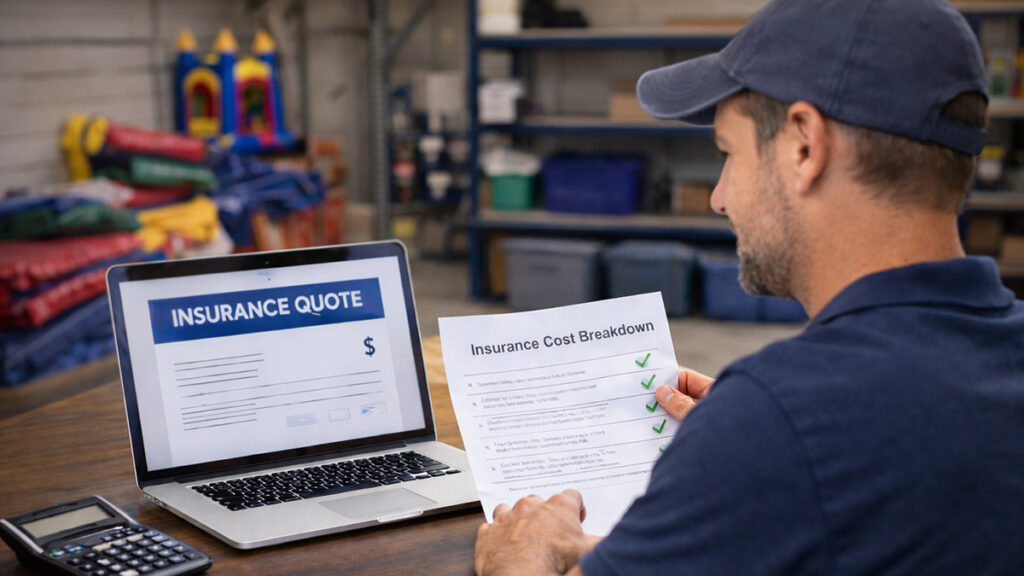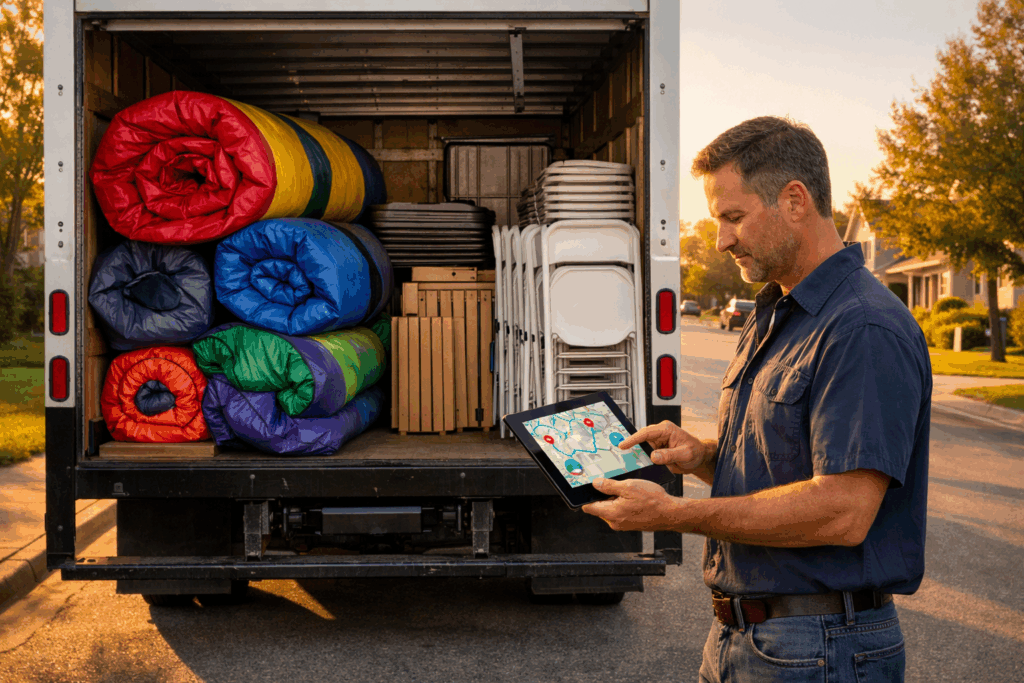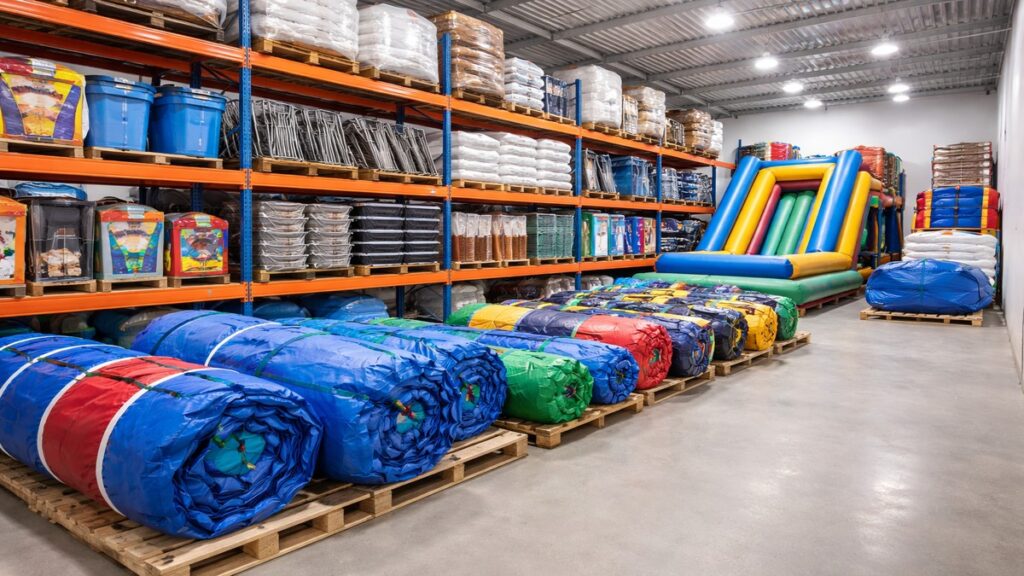Why Party Rental Businesses Are Great Weekend Gigs for Entrepreneurs
Party rental businesses are startup friendly, established, low-risk revenue generators that have several advantages over other part-time ventures including:
- Low startup costs
- Consistent demand in a growing market
- Easy scalability
- Flexible hours
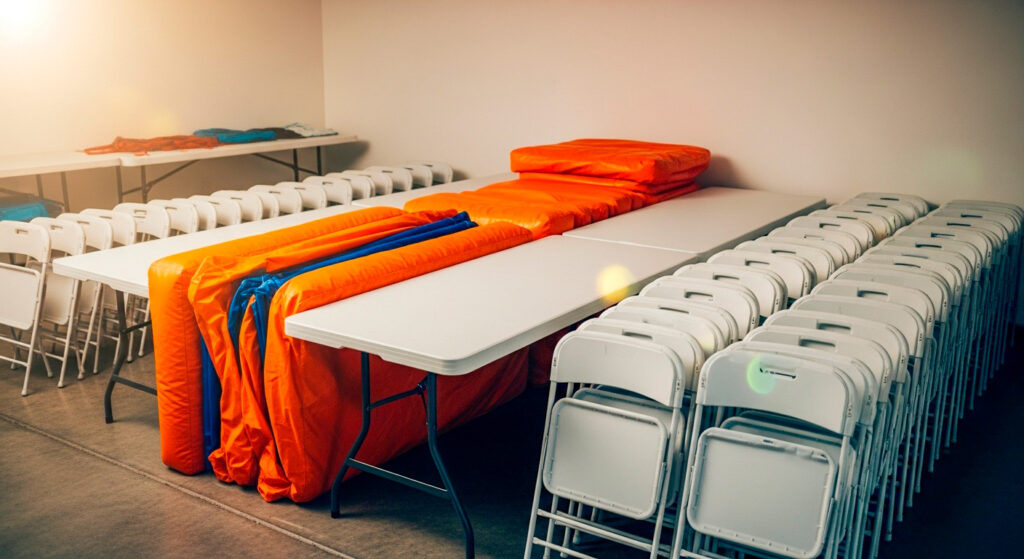
Low Barrier for Entry
Whereas startups in other industries like food services, tech, or e-commerce face drawbacks like complex permitting, long lead times, and high marketing costs, a party rental business can start generating revenue in as little as two weeks with an insurance policy in place and an upfront investment of $5,000 to $7,000. A party rental business can also be run from home and requires no expert knowledge or specialized training.
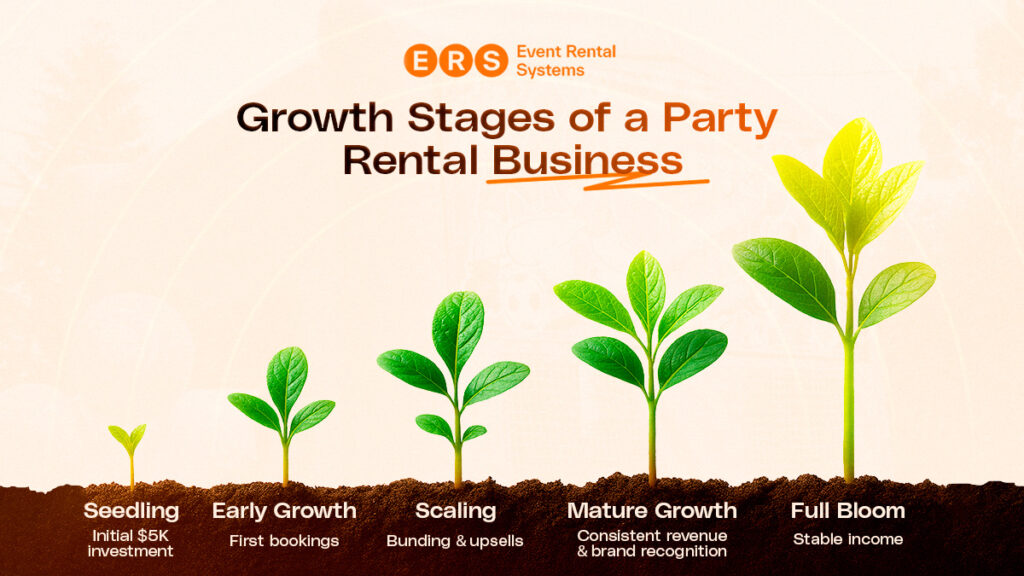
Profitability
The party rental business offers an opportunity for strong, early-stage returns. For example, with the proper care, party rental items are low-maintenance, long life-span investments that can be easily upsold and bundled for high-margin transactions. With a strategic marketing effort, you can pay-off an initial $5,000 investment in the first 3 to 6 months of launch.
In fact, our recent article analyzed the most profitable side hustles to start, placing party rentals alongside other popular startups like pet care and vending machines with low upfront costs and high average earnings.

A Rapidly Expanding, Stable Market
In the US alone, the party and party rental industry is already valued at more than $5 billion. Fueled by the post-COVID boom and an ever-expanding list of partys to celebrate, it is predicted to reach $8 billion by 2033. Additionally, party rentals is a sector that’s less vulnerable to market fluctuations than other higher risk side gigs like real estate or financial markets.

Naturally Scalable and Niche
For a party rental business owner every booking offers a chance to easily increase an order value by bundling inflatables with tables and chairs or upselling concessions and photo booths. This acts to increase ROI, which makes it easier to invest back into and expand your business. The party rental market also allows for a high degree of specialization, where the small business owner can carve out their own niche for the type and theme of the equipment they rent out and the audience they cater to.

Lifestyle
When considering how to start a party rental business, one of the most attractive upsides is the healthy work/life balance. Unlike other side hustles that demand long hours and scheduling around your day job, party rentals are almost entirely weekend-based. With most of the work limited to deliveries, setup, and pickup, you’ll have the time and flexibility to actually enjoy your time off.
What is Required to Run a Party Rental Business?
Launching a party rental business does not require a storefront or employees, but it will involve purchasing the necessary equipment, acquiring the required licenses, and making decisions on what tools to add-on to make sure that your business gets off to a smooth start.
The Non-negotiables for a Party Rental Startup
Running a rental business means providing customers with big items they don’t want to buy, like tables, chairs, bounce houses, and concession machines. You’ll also need an easy way to store, move, and set up that equipment.
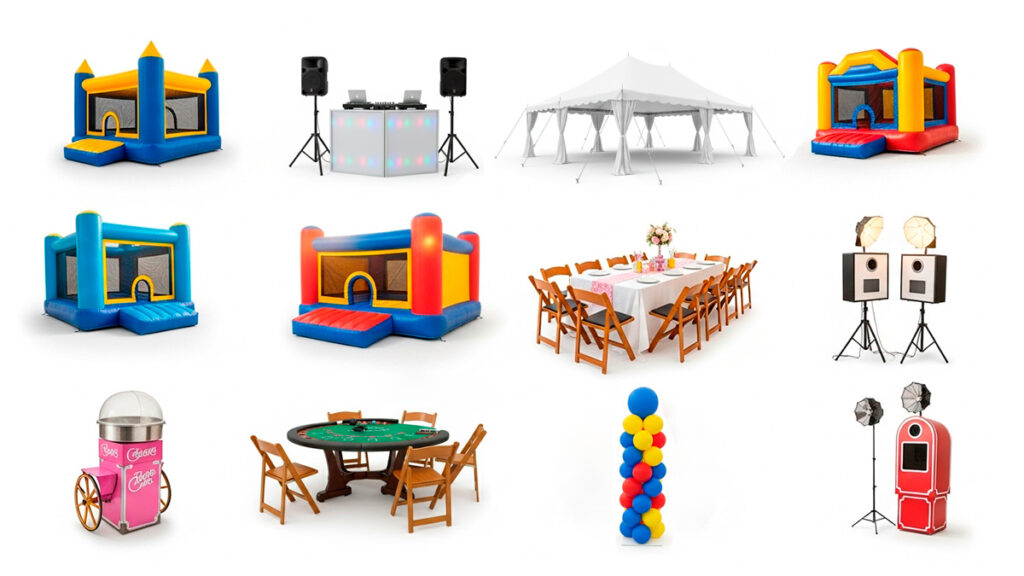
Equipment
There’s no shortage of options for what your rental startup can offer customers. A selective list of available items would include:
- Bounce houses
- Inflatable slides
- Tables and chairs
- Cotton candy machines
- Photo booths
As you can see from the list above, you will have a lot of freedom in choosing what items you want to carry in your inventory.
With respect to cost, a rental business just starting out can purchase 6 tables, 40 folding chairs, and a basic bounce house for about $3,000. Whichever items you choose to buy, keep in mind that this is the key investment in your business, therefore, you need pieces that are in-demand, durable, and low-maintenance.
Want to put your inventory management on autopilot? Automate item tracking and online ordering with ERS rental software
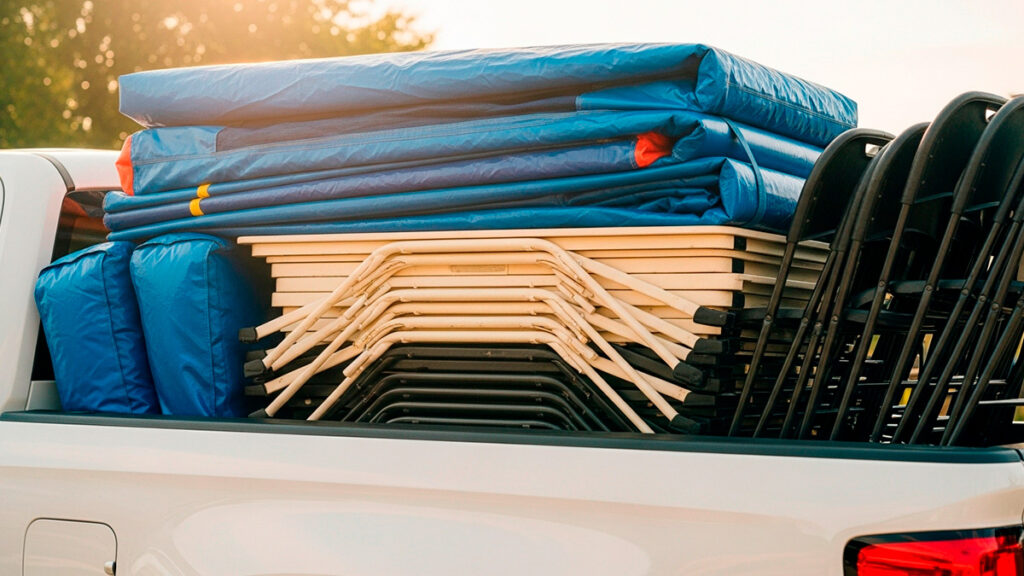
Storage
Once you have purchased your inventory, the next step is finding a place to store it. Fortunately, there are easy and accessible solutions to keep your items clean, dry, and secure. Many rental startups operate using their own garage or a small rental unit to house their inventory. One important consideration is keeping your inventory organized to facilitate fast and easy deliveries.
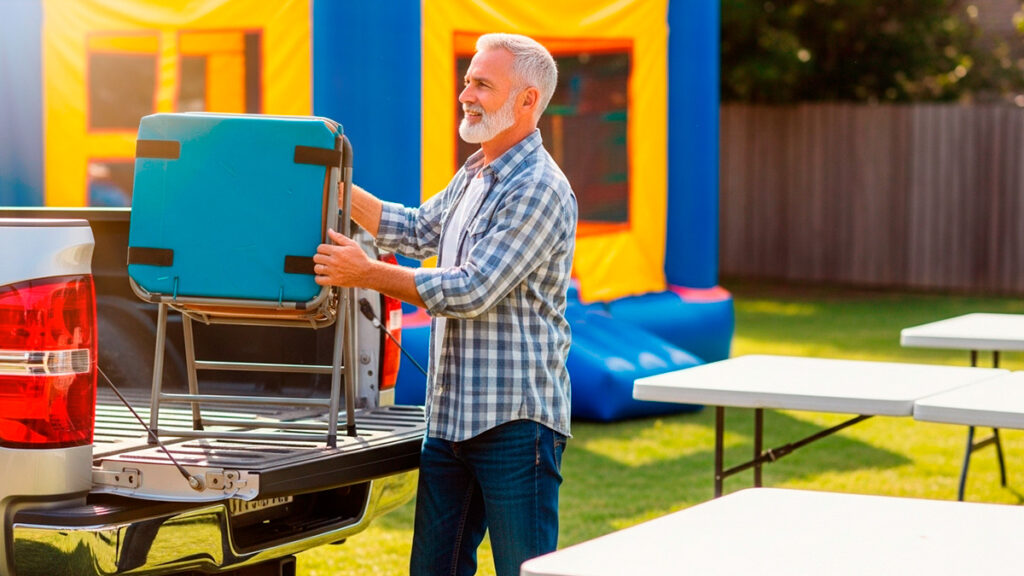
Delivery and Logistics
When it comes to running a party rental business, delivery and setup should be treated as part of the service — something customers will expect you to handle. However, you don’t need a specialized delivery truck to conduct business; a pickup truck or trailer will be able to handle deliveries for your startup.
What matters most is the logistics of your delivery. This means having smooth and organized loading and unloading and efficient route planning. Paying close attention to these details will save time, impress customers, and pay off in the form of referrals and repeat business.
Overhead and Admin Requirements
While inventory, storage, and delivery logistics will be your business. There are other requirements that need to be met in order to run your business. Below are the permits, licenses, paperwork, and insurance coverages you will need to operate your rental startup legally and in compliance.
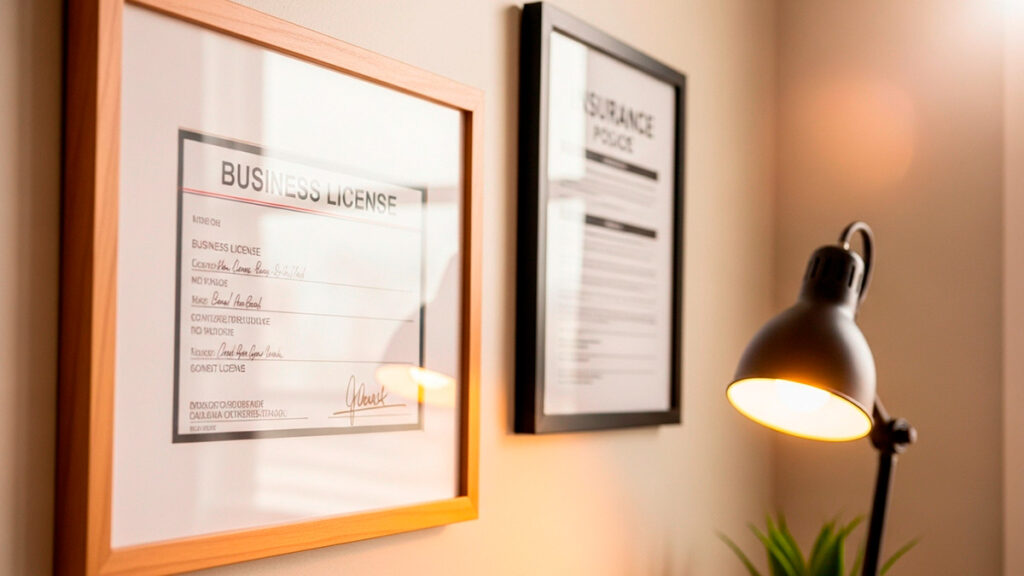
Business Registration and Permits
Which permits and licenses are required to run your party rental business will vary depending on your city, county, and state. However, you will first have to register your business, which means creating the legal entity under which it will operate (most owners choose to register as an LLC). You’ll likely also need to register your business with your city or county to acquire the necessary tax, storage, and temporary structure permits.
Rental Agreements
A rental agreement is the legally binding contract between your business and the customer. Having a signed agreement in place that clearly details the expectations and responsibilities of both parties will protect your business and help avoid disputes.
At a minimum, the rental agreement should contain:
- Customer information: name, address, and contact details
- Order details: items rented and any notes on their condition
- Rental period: delivery and pickup dates/times
- Pricing and payment terms: total costs, deposits, late fees, and damage charges
- Liability and safety rules: proper use of equipment and damage responsibility
- Cancellation policy: timelines and refund terms
- Signatures: from both parties to make the agreement binding
Although many party rental startups operate with paper agreements, switching to digital contracts can save time, simplify record-keeping, and offer customers a more convenient booking experience
Insurance Policies
Accidents can happen, so your party rental business will need to budget for taking out insurance policies that not only protect your liability, but also your equipment and delivery vehicles.
Liability Coverage
Liability insurance is essential for operating a party rental business. Your policy should cover any property damage and/or injuries that result from the use of your equipment. It will also cover the associated legal expenses in case of a lawsuit.
Commercial Vehicle Coverage
A commercial auto insurance policy is not always legally required, but personal car insurance policies usually do not cover claims on accidents that occur during businessrelated driving. Therefore, a smart party rental startup should consider this as necessary coverage to protect their business.
Commercial Property Coverage
A commercial property policy will protect against damage or loss of your equipment due to occurrences like fire or theft. Although not legally required, it makes sense to protect the lifeline of your business — no equipment means no rentals, and no rentals means no revenue.
Cleaning and Maintenance of Inventory
Thorough cleaning and proactive maintenance are important aspects of operating a party rental business. Your customers will expect that your equipment is safe and sanitary, and consistently meeting their expectations builds trust. Rental items should be regularly cleaned, inspected, and stored in an environment that prevents deterioration. Regularly scheduled servicing and a forward-thinking approach to repairing and replacing parts will not only extend the lifespan of your equipment but will also attract loyal customers as well.
Ready to launch your startup like a pro? Learn how ERS software for party rentals can kickstart your success
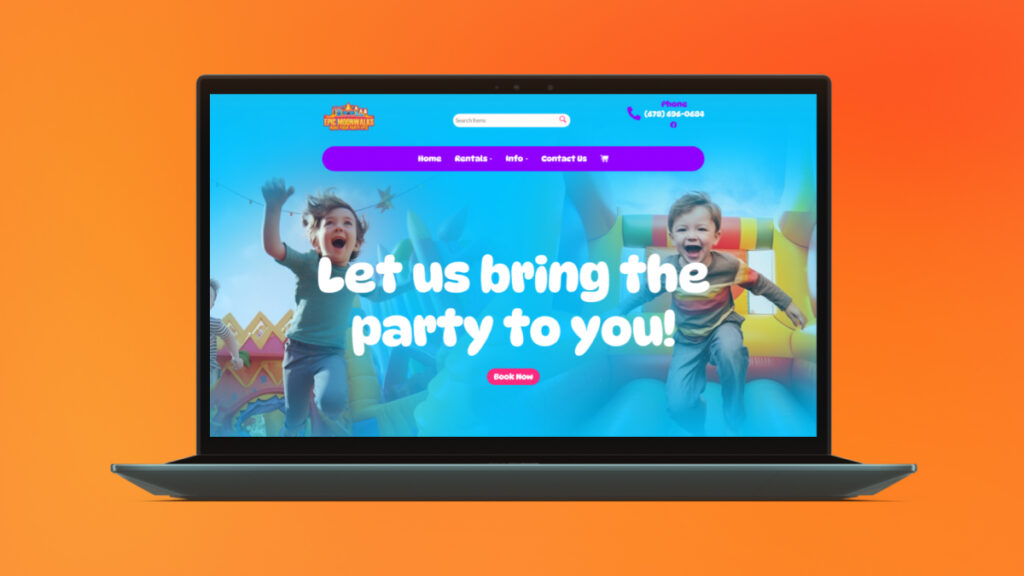
Valuable Tools for Growth
The following optional upgrades aren’t essential to run your party rental startup, but they will make it operate more efficiently and turn it into a thriving business.
A Dedicated Website
Many party rental businesses operate without a dedicated business website. In an industry so dependent on local SEO, having a dedicated website represents an easy opportunity to distinguish your business from your competitors.
Online Booking
Too many party rental startups still manage their reservations using spreadsheets — an inefficient, error-prone method that can lead to double-bookings and a poor user experience for customers. Online booking allows customers to reserve at their convenience, 24/7, while relieving you from the headache of manual scheduling.
Online Payments
Online payments are a feature that today’s customers take for granted, yet one many party rental startups still don’t offer. They allow customers to pay at their chosen time, using their chosen method, with the business owner benefiting from faster payment clearance and easier payment tracking.
Marketing Tools
Having a dedicated party rental website is only the first step in building a strong digital presence and growing your business. While your website will be the hub where customers get info on your services and book online, digital marketing will be the vehicle that drives them there — through strategies like SEO, social media, and email campaigns. There are also organizations like IAAPA (The Global Association for the Attractions Industry) that can provide education, networking, and other essential resources.
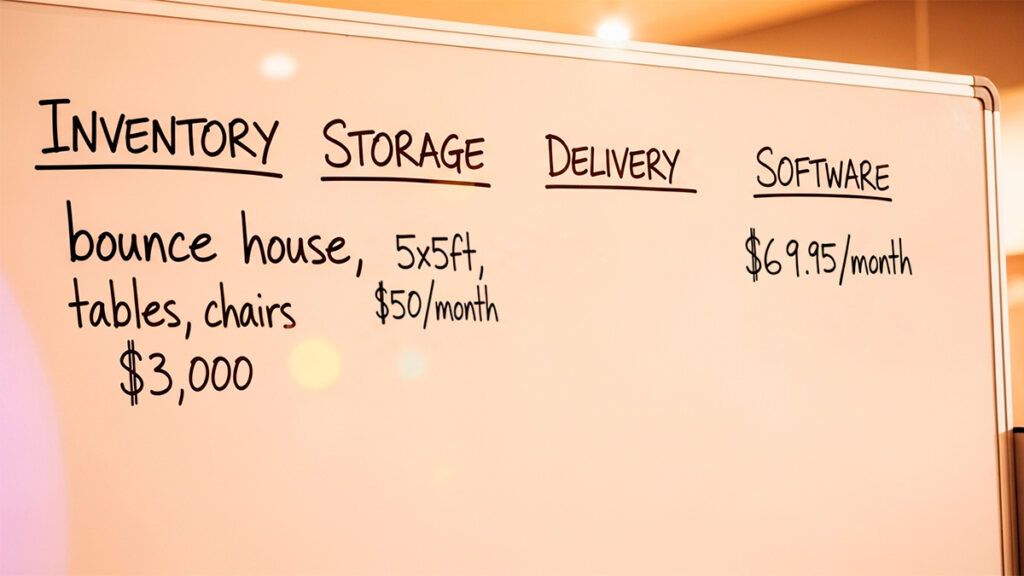
Strategically Launching Your Party Rental Business
For those considering starting a weekend-based business in 2026, party rentals is an industry that offers tremendous upside. A low barrier for entry, consistent demand, easy specialization, and high returns all combine to make it one of the best side hustles out there.
By meeting certain business requirements and making smart decisions, an party rental business has the potential to grow beyond supplemental income to a bona fide enterprise.
Accordingly, one of the smartest decisions you can make to position your startup for consistent growth is investing in party rental software created for the unique needs of the party rental industry. Our ERS Launch package was specifically designed as a do-it-yourself, easy-to-use solution for party rental startups wanting access to features including:
- Online booking
- Inventory management
- Integrated payments
- Automated customer messaging
- Website templates
- Performance tracking dashboard
- Financial reports
- Built-in marketing tools
Therefore, if you’re a budget-conscious party rental entrepreneur seeking to grow your business in 2026, and are interested in learning more about software for bounce house rental businesses, contact our sales team today to go over any of your questions and discuss the next steps.
ERS Launch will put you on the fast track to profitability. See our startup-friendly pricing
Frequently Asked Questions
How much does it cost to start a party rental business?
The up-front cost to start a party rental business typically ranges from $4,000 to $7,000. For example, buying a starter set of 6 tables, 40 folding chairs, and a basic bounce house should cost around $3,000. Additional first-year expenses, in the form of permits, insurance, storage, and cleaning supplies, can be estimated at another $2,500. Investing in a website and digital marketing campaigns normally costs $500– $1,000.
Want to run your own numbers? Use our free Startup Cost Calculator
Otherwise, here’s an example breakdown:
| Expense | Estimated Cost Range |
|---|---|
| Startup inventory (6 tables, 40 chairs, bounce house) | $3,000 |
| Storage (garage, shed, or storage unit) | $0 – $150/month |
| Business registration & permits | $400 |
| Insurance (liability, commercial vehicle, property) | $300 – 1,200/year |
| Cleaning & maintenance supplies | $300 |
| Digital Marketing | $500 – $1,000 |
| Total | $4,000 – $7,000 |
How do I find my first customers?
The majority of first-time rental customers find party rental businesses through online methods including search, maps, and localized discovery platforms. This means that prioritizing a digital presence (website with online booking, social media accounts, online marketing) is the most efficient way to get customers. Don’t forget that word-of-mouth still works, so use your friends and family to help get the word out.
How quickly can I start making money with a party rental business?
Once you have equipment to rent out, a website, and a Google Business Profile, you can expect to receive your first booking in 1–3 weeks. Many startups pay off their initial investment in the first 3–6 months.
| Charge per order | $250–$400 |
|---|---|
| Bookings per month | 6–10 |
| Monthly revenue | $1,500–$4,000 |
| Delivery and maintenance costs per booking | $20–$50 |
| Estimated net per order | $160–$350 |
| Estimated net per month | $960–$3,500 |
| Startup cost recovery timeline | 3–6 months |
Do I need insurance before I start renting out equipment?
Yes, having insurance will be necessary to running your party rental business. Many customers will ask for proof of insurance and many jurisdictions will require coverage before you can obtain permits.
What kind of equipment should I buy first?
These are the factors that you should consider when deciding on what inventory items to buy first:
- Are the items constantly in-demand?
- Are the items durable?
- Are the items easy to store and transport?
- Can the items be sold as a package?
Prioritize items that are in-demand, durable, easy to store and transport, and bundle well. This approach will launch your startup on solid footing and on the fast-track to profitability. Once your business is netting a profit off of these items then you can consider strategically scaling by investing in premium and niche items to add to your inventory.
A pro-tip to build up your inventory would be to use swap-in banners. This way you can have multiple themes from only a few base units. Smart software tracks the themes vs. units so you don’t make the mistake of overbooking.

